Welcome to our Vegan & Low FODMAP Series!
If you are wondering if you can follow the low FODMAP diet while also following a vegan diet this series is for you.
Written by 2 of our Success Team Member Dietitians, Rachel Meltzer Warren MS, RDN and Kathryn Adel MS, RD, CSSD and FODMAP Everyday Co-Founder and Food Expert, Dédé Wilson.
We cover everything:
- Which are the best low FODMAP ingredients to keep you happy and healthy.
- How to make sure you get your nutritional needs met.
- And how to convert low FODMAP recipes into low FODMAP vegan recipes that work!
Be sure to read the other two articles in the Vegan and Low FODMAP Series:
- Vegan & Low FODMAP Series: Can a Vegan or Vegetarian Go Low FODMAP?
- Vegan & Low FODMAP Series: Expert Tips on Nutrition For Vegans Following The Low FODMAP Diet
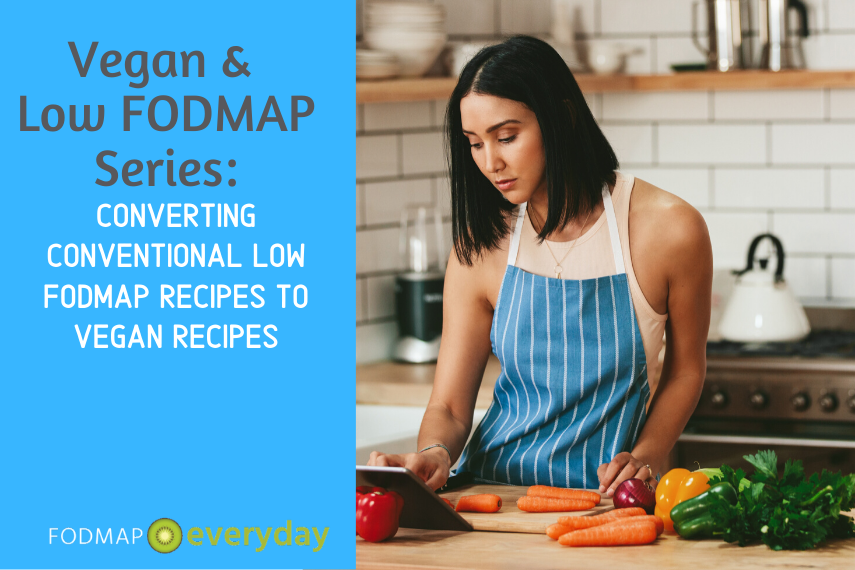
Use Our Recipe Filter
You can also use our exclusive filter by checking off “Vegan” to peruse the recipes on the site that are already tailored for you, if you are following a vegan diet.
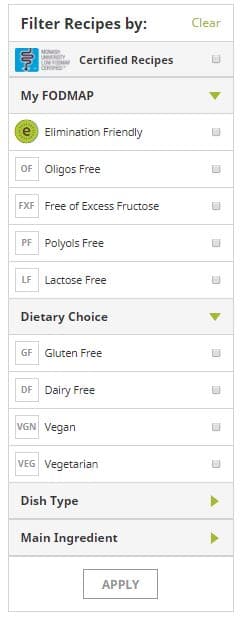
But to be able to expand your options, we have additional ideas to help you, which is what this article is all about.
Limit Your Elimination Phase
Some important info before we dive in. It is not recommended that any other sort of restrictive diet be followed concurrently with the initial Elimination Phase of the low FODMAP diet. As always, it is suggested that you undertake the low FODMAP diet with the assistance of a Registered Dietitian. Additionally, if you are vegan it is recommended that your Elimination Phase be limited to two weeks. This is for optimal gut health and nutrient intake.
You May Want To Read: The Low FODMAP Diet Elimination Phase: Short & Sweet for Your Health!
Make Smart Swaps
In your pre-FODMAP vegan life you probably learned how to make certain swaps, like making flax eggs to use in lieu of chicken eggs, or by using soymilk instead of cow’s milk. Now that you are following the low FODMAP diet, you have to ALSO pay attention to FODMAP load, so swaps have to be scrutinized a bit more.
And because you will be making swaps that will be unique to your situation, you must educate yourself about FODMAPs in general, as well as FODMAP Stacking.
We also recommend some general reading:
- What Is A Low FODMAP Serving Size?
- Soy & The Low FODMAP Diet
- Soy Products – Low FODMAP or Not?
- What If A Food Has Not Been Lab Tested for FODMAPs?
- What Is FODMAP Stacking?
- Can A Vegan or Vegetarian Go Low FODMAP?
Understand Recipe Development
We have a huge caveat to make: When you make a change to a recipe, for instance swapping spinach for kale, or chia eggs for chicken eggs, you not only alter the FODMAP load, but you also change the ratio and choice of original ingredients. This in turn will change the outcome of the recipe – and most often not for the better.
What we mean by this is, if a recipe was developed and tested with chicken eggs, butter and cow’s milk and you substitute chia eggs, margarine or oil and an alt milk, we can guarantee that the recipe will not come out as originally intended and therefore you are entering the world of custom recipe development yourself.
Not that there is anything wrong with that! We want you to be able to tweak recipes for your needs, but just be aware that the taste and texture will change, even the yield could change, and the original cooking directions might not work the same.
It is a bit of a wild, wild west situation, and those with basic cooking and baking skills will have an easier time of creating vegan recipes from conventional recipes that work in all regards.
Use Your Apps
We are huge proponents of both the Monash University and FODMAP Friendly smartphone apps. These two entities are the only two that are lab testing foods for FODMAPs and publishing the results and we believe that you cannot effectively follow the diet without these resources – whether you are vegan or not.
With these apps at hand you will have up-to-date information at your fingertips and will be able to understand what swaps you can make and in what combinations in order to remain low FODMAP.
All that said, here are some swaps that work well for those following a vegan low FODMAP diet.
Low FODMAP Vegan Swaps
We know that you will often need to make swaps, such as tofu for poultry, or alt milks for conventional.
Always check your apps to gauge proper low FODMAP amounts. For instance, a recipe featuring chicken might be low FODMAP, and indeed the chicken contains no FODMAPs, but if you swap in tofu or beans, those DO contain FODMAPs, so you need to know what the FODMAP limits are per serving.
Also remember that the lab tested amounts of FODMAPs are where you start your FODMAP education. Your own tolerances might be more – or less! Just because the Monash app says that 170 g of firm tofu is low FODMAP your own digestive experience is the ultimate test.
If you haven’t purchased a digital food scale yet…. stop and do! Pick one that has big bright numbers, ounce and gram weight options, and tare. Check these options out here.
Butter Alternatives
I get a lot of questions about non-dairy butter substitutes. Here is my formal statement: If you are following a recipe, for sugar cookies, for instance, where we have developed and tested the recipe with dairy butter, and that butter is a significant part of the recipe, I can guarantee that the recipe be quite different in taste, texture and even in how it “works”.
For instance, I know that our rolled sugar cookie recipe rolls out quite easily when made with butter and the flour that is recommended. I cannot vouch for what it will act like if made with a non-dairy butter alternative.
On the other hand, if you are making an omelet and want to melt some non-dairy butter in a pan to make your eggs, a little non-dairy butter will probably work quite well with little textural issues, although the taste will not be the same.
What Non-Dairy “Butter” Do You Recommend?
If I am cooking or baking and need a non-dairy “butter” alternative, I often use Earth Balance Buttery Sticks.
Milk Alternatives
You can use almond milk, coconut milk (check apps for types; FODMAP content varies and watch out for high FODMAP inulin), hemp milk, macadamia milk, oat milk, quinoa milk, rice milk and soymilk made from soy protein isolate. In the U.S. there is only one brand available at this time, 8th Continent, with very limited availability.
Check for brands in your area and country. Monash has lab tested and certified Sanitarium brand Regular So Good Soy Milk and Lite So Good Soy Milk (available in Australia).
There are even cashew milks that have been lab tested and certified as low FODMAP, such as Sanitarium brand (Monash) and The Nutty Milk Company (FODMAP Friendly). Did you not know that? Get the apps! All the info will be right in your hand.
Homemade Egg Alternatives
Many vegans who are not following the low FODMAP diet will use flax eggs as a substitute. This is a combo of ground flax seeds and water, which after sitting for a few minutes, creates a gelatinous texture and can function as an “egg” in many recipes. Like chicken eggs this mixture will help to create texture and provide a binding action in recipes.
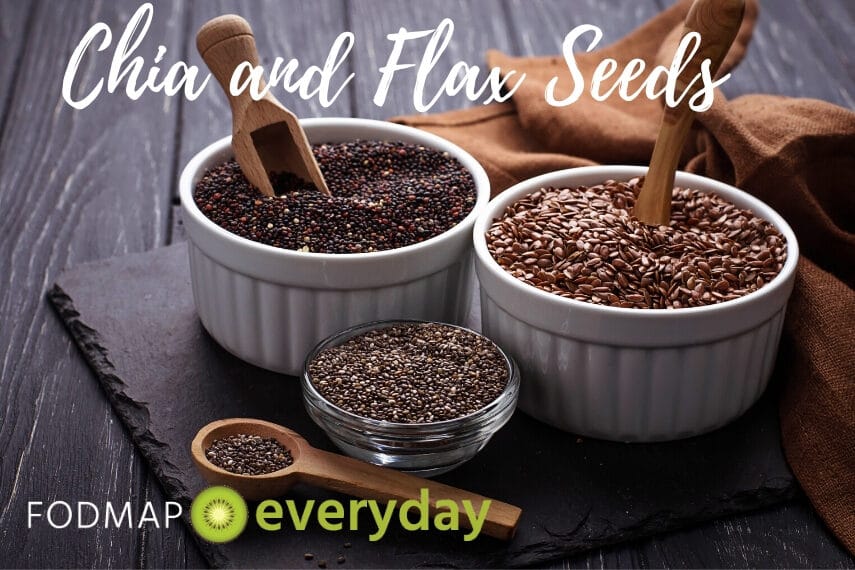
Chia eggs are made and act the same way.
- 1 tablespoon ground flax seeds + 3 tablespoon water + time = 1 large egg
- 1 tablespoon chia seeds + 3 tablespoon water + time = 1 large egg
The timing can be variable. Give these mixtures a rest of at least 5 minutes; you want the mixture to create a gel-like texture; don’t rush it.
Monash University and FODMAP Friendly have both lab tested flax seeds (also called linseeds) and they state that they are low FODMAP at 1 Australian tablespoon (15 g according to Monash; 14 g for FODMAP Friendly).
Both have also lab tested chia seeds. Monash states that 2 Australian tablespoons (24 g) are Green Light low FODMAP; FODMAP Friendly says that 3 tablespoons (30 g) are high FODMAP, specifically for GOS. Watch your amounts!
Eggs contain no FODMAPs. So, you can see that you can make a swap of a “vegan egg” for a chicken egg, but the FODMAP load in your recipe will increase.
Commercially Available Egg Replacers
Two commercially prepared products designed as egg replacers are low FODMAP: Vegg Vegan Egg Yolk, made primarily from nutritional yeast, and Ener G Egg Replacer, made from potato starch and tapioca starch flour. The latter does contain calcium lactate but the manufacturer states that it is “not derived from dairy”.
Always read labels as not all egg replacers will be low FODMAP.
Additional Foods & Pertinent Info
Here we will dive into a few items that are popular with vegans and discuss whether they can be part of the low FODMAP diet.
Please note that some of the following popular vegan foods are low FODMAP and some are high FODMAP.
Agar-agar
Sometimes simply called “agar”, this vegan gelatin substitute is derived from red algae. It has been lab tested by Monash and they state that a low FODMAP serving is 7 g.
Apple Cider Vinegar
Although apples themselves are high FODMAP (although they do have a low FODMAP portion of 20g to 25 g depending on variety), apple cider vinegar has been lab tested by both FODMAP Friendly and Monash University. FODMAP Friendly gives apple cider vinegar a “Pass” at 1 tablespoon (14 g). Monash lab tests state that 2 Australian tablespoons (42 g) are Green Light low FODMAP.
Applesauce
Applesauce is often recommended as an egg, and sometimes as a fat, replacer in baking recipes. Unfortunately, it is high FODMAP. It has not been lab tested, but apples have a very small low FODMAP serving size of 25 g tops.
Aquafaba
This magical liquid, made from the discarded liquid from canned chickpeas, is often used in lieu of egg whites in vegan baking and cooking. The GOS FODMAPs in chickpeas are water soluble and there will be a high concentration in the liquid. This is not a low FODMAP ingredient.
Coconut Oil
All oils, being fats, are low FODMAP. If you like a coconut flavor, use unrefined coconut oil. If you want a more neutral flavor, use refined. Personally, I find coconut oil to sit very heavily in my gut and it is not my preference, but it is low FODMAP! The point is, you might not react the same to all oils and fats.
Dried Mushrooms
Dried mushrooms are packed with umami. Monash has tested a couple: dried shiitake are low FODMAP in 7 g portions and porcini in 10 g amounts. Which is actually a lot (see below). FODMAP Friendly has tested dried black fungi mushrooms and recommend a serving size of 1 cup (60 g).
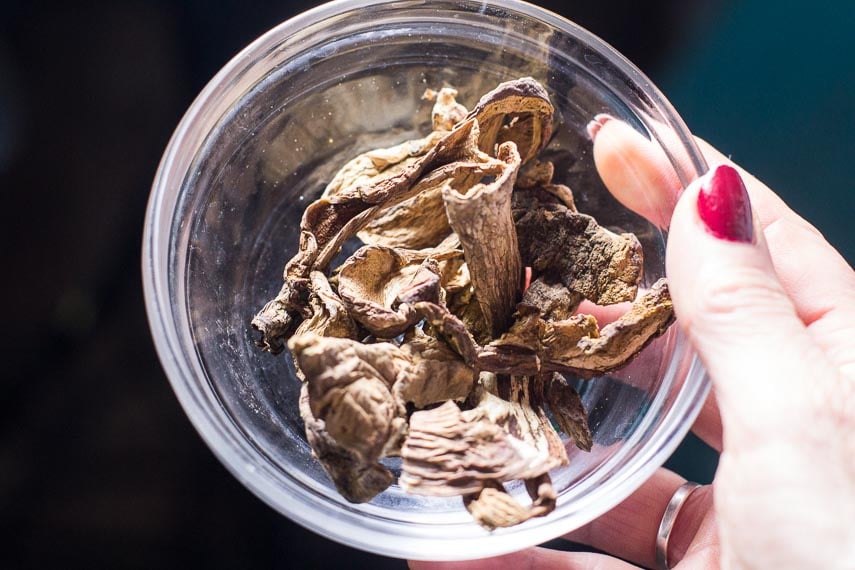
Kelp Noodles
This is pasta made from kelp! They have been lab tested by Monash University and a low FODMAP serving size is 1 cup or 113 g.
Liquid Smoke
This ingredient is actually all-natural and consists of collecting smoke and then condensing the vapor. Be aware that some brands add additional ingredients that might not be low FODMAP. I like Wright’s brand, which comes in both hickory and mesquite varieties, and they contain nothing but water and natural smoke flavor.
Marmite/Vegemite
Both of these beloved dark brown, sticky jam-like spreads are based on yeast extracts (by-products from the beer making industry). They are lab tested and low FODMAP. Monash says Vegemite is low FODMAP in amounts of 1 teaspoon (5 g). FODMAP Friendly says that Marmite is low FODMAP in amounts of 1 teaspoon (6 g). Yes, this is a small amount, but they are powerfully flavored.
Miso
Some soy products are low FODMAP and some are high. Miso is low FODMAP and Monash recommends serving sizes of 2 Australian tablespoons (12 g). FODMAP Friendly says 1 Australian tablespoon (15 g) is low FODMAP.
Nutritional Yeast
We LOVE nutritional yeast sprinkled on popcorn (try Bragg’s brand). Both Monash and FODMAP Friendly have tested a low FODMAP portion is 1 tablespoon (16 g).
Quorn
Monash has lab tested minced Quorn, which is made from mycoprotein, a protein source that is meat-free and naturally low in saturated fat and high in fiber. Monash says a low FODMAP portion is 75 g and also warns that some Quorn products contain garlic and/or onion, and even egg white or milk products, so please read labels.
Sea Vegetables
Some seaweeds have been lab tested. Monash has tested nori and it is low FODMAP in amounts of 5 g, which is usually 2 average sheets. Dulse is low FODMAP in 2 teaspoon amounts of 10 g.
Seitan
This is made by kneading wheat flour or vital wheat gluten with water and washing away the liquid, creating the elastic, low carb, protein-rich seitan. There is a lot to unpack here! First of all, it is vegan, but it is not gluten-free. I can be low FODMAP, but you have to read labels, as many brands add garlic or other high FODMAP ingredients.
Shirataki Noodles
Also called konjac noodles and miracle noodles, these are made from glucomannan, a type of fiber that comes from the root of the konjac plant. They contain no digestible carbohydrates. They have been lab tested by FODMAP Friendly: 125 g uncooked or 125 g cooked are low FODMAP (that is not a typo that the weight is the same).
Soy Cheese
Monash has tested some soy cheese and state that 40 g is a Green Light low FODMAP serving. The caveat is that we do not know what soy cheese they tested and brands vary. Read labels and use your smarts.
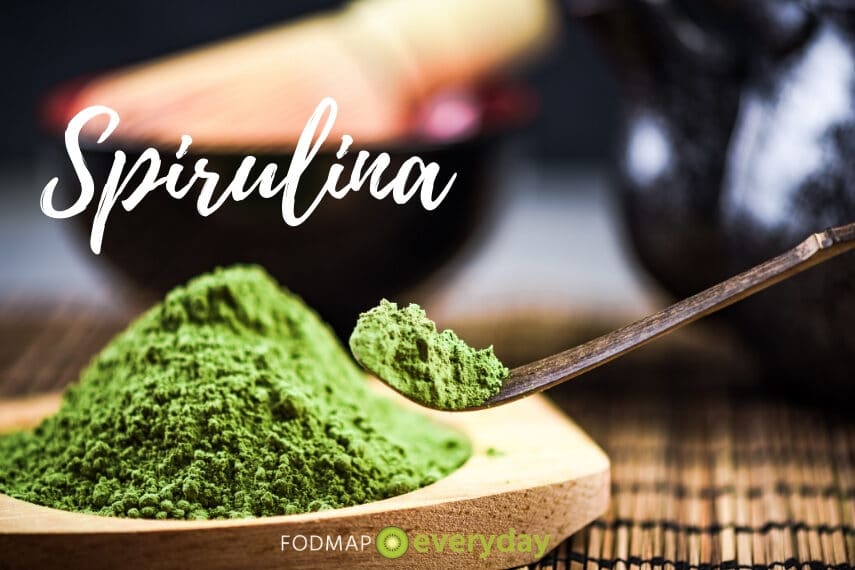
Spirulina
This is a nutrient dense food derived from blue-green algae and has been lab tested by Monash and FODMAP Friendly. Monash has declared that no FODMAPs were detected upon lab testing. They suggest a 2 teaspoon or 8 g serving. FODMAP Friendly suggests a 5 g serving.
Tahini
Tahini is a condiment made from ground sesame seeds and is vegan. It has been lab tested by both FODMAP Friendly and Monash University. FODMAP Friendly gives it a “Fail” at 2 tablespoons (30 g). Monash lab test results report that 1 Australian tablespoon (20 g) is low FODMAP. Note that a mere 1 ½ tablespoons become Moderate for FODMAPs.
Textured Vegetable Protein (TVP)
This product is made from defatted soybeans. Some soy products are low FODMAP, but TVP, which is made from mature soybeans, is high in both GOS and fructans and is considered high FODMAP.
Vegan Butter Substitute
Many folks like Earth Balance Vegan Buttery Sticks as substitutes for butter in baking. They are vegan and low FODMAP. Note that while you can try these as a butter substitute, there will be difference in flavor and texture of your final product.
A Note On Sprouting
Many people, vegans included, are interested in sprouted foods. To quote Monash, “While they’re marketed for their superior nutrient profile, there is limited evidence to support the benefit of these products over non-sprouted alternatives.”
Monash decided to lab test wheat grain, barley grain, rye grain, chickpeas, red kidney beans and mung beans to assess any FODMAP changes that might occur.
In each instance the food was covered with water and soaked overnight for at least 12 hours, after which they were wrapped in muslin and rinsed with fresh water being every day until 1 cm sprouts appeared (3 to 6 days). The entire sprouted item was then lab tested.
Every item showed reduced FODMAPs after sprouting, except chickpeas, where the FODMAP content increased. Just goes to show you that you cannot make broad extrapolations.
From Monash: “The theory behind the changes in FODMAP content with sprouting are related to enzymes present within the grain or legume. Upon germination of the grain or legume, enzymes are activated which can break down the oligosaccharide chains. In some cases, the enzyme may not be able to act sufficiently to have any effect on the FODMAP content, such as the case with the chickpeas found here.”
The Takeaway
It is possible to follow a low FODMAP diet while also maintaining a vegan diet. It does take more attention to detail; self-education of both diets is paramount. If you are starting the low FODMAP diet, please work with a FODMAP trained and vegan savvy RD and keep your Elimination Phase to 2 weeks. Use the FODMAP Everyday® filter to search for “Vegan” recipes and use this article to help you turn any recipes you might find into a vegan alternative.
Check out our low FODMAP Vegetarian and low FODMAP Vegan Recipes!
Just use the filter on the RECIPES archive page to see just how many delicious and Low FODMAP meals you can enjoy! Keep checking back for more as we add recipes every week!
Be sure to read the other two articles in the Vegan and Low FODMAP Series:
- Vegan & Low FODMAP Series: Can a Vegan or Vegetarian Go Low FODMAP?
- Vegan & Low FODMAP Series: Expert Tips on Nutrition For Vegans Following The Low FODMAP Diet
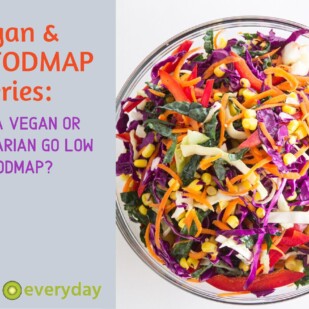
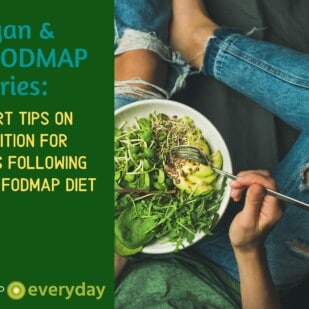






Hey!
I’m vegan and have IBS for 8 years now. And finally am open to try the low fodmap diet, to find out what I react to.
But I have a question about the aquafaba. It is high FODMAP but is it allowed in very small portions? We use this to make our vegan mayonaise. So it only contains the fluid of one can, to make a big jar and we eat from this mayonaise with 4 people for a week.
Any idea of this is okay during the elimination phase?
Thanks in advance!
Greetings,
Sigrid Verbelen
Hi Sigrid, so glad you found out article and that you reached out.There are really two questions here. Is aquafaba low FODMAP, if it is a very small amount and a second, very different question, which is can YOU tolerate mayonnaise made from aquafaba? There is no known low FODMAP amount of aquafaba. BUT, and this is a big but, if you go through a structured Elimination Phase – not eating any aquafaba – and then during your Challenge Phase test amounts of your mayonnaise on yourself, you will determine whether you can tolerate any, and if so, how much! So no easy answer, and this process takes time, but ultimately you will have the answer that pertains to your unique GI system.